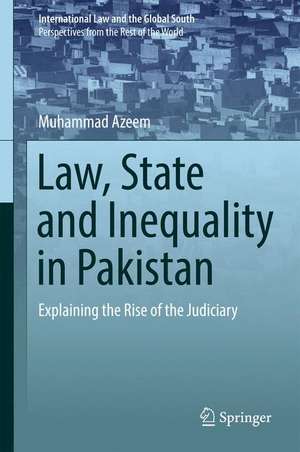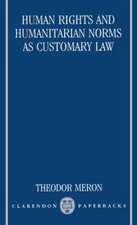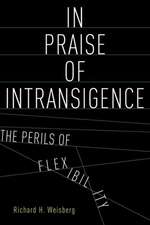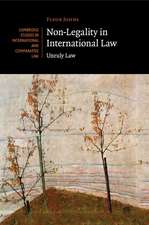Law, State and Inequality in Pakistan: Explaining the Rise of the Judiciary: International Law and the Global South
Autor Muhammad Azeemen Limba Engleză Hardback – 13 iul 2017
| Toate formatele și edițiile | Preț | Express |
|---|---|---|
| Paperback (1) | 640.55 lei 6-8 săpt. | |
| Springer Nature Singapore – 15 aug 2018 | 640.55 lei 6-8 săpt. | |
| Hardback (1) | 896.21 lei 6-8 săpt. | |
| Springer Nature Singapore – 13 iul 2017 | 896.21 lei 6-8 săpt. |
Preț: 896.21 lei
Preț vechi: 1092.93 lei
-18% Nou
Puncte Express: 1344
Preț estimativ în valută:
171.54€ • 186.40$ • 144.19£
171.54€ • 186.40$ • 144.19£
Carte tipărită la comandă
Livrare economică 21 aprilie-05 mai
Preluare comenzi: 021 569.72.76
Specificații
ISBN-13: 9789811038440
ISBN-10: 9811038449
Pagini: 278
Ilustrații: XVIII, 278 p.
Dimensiuni: 155 x 235 x 24 mm
Greutate: 0.59 kg
Ediția:1st ed. 2017
Editura: Springer Nature Singapore
Colecția Springer
Seria International Law and the Global South
Locul publicării:Singapore, Singapore
ISBN-10: 9811038449
Pagini: 278
Ilustrații: XVIII, 278 p.
Dimensiuni: 155 x 235 x 24 mm
Greutate: 0.59 kg
Ediția:1st ed. 2017
Editura: Springer Nature Singapore
Colecția Springer
Seria International Law and the Global South
Locul publicării:Singapore, Singapore
Cuprins
Part One: Law under modernization: foundational discourse.- Chapter 1 -Critique of institutionalist-functionalist focus of the good governance paradigm.- Chapter 2 - Law under capitalist modernization (1947-1960’s).- Chapter 3 - Law under socialist modernization (1970’s-1980’s).- Part Two: Law under neo-liberal development: Rights for democratic deficit.- Chapter 4- The rise of the judiciary in a ‘weakening state’ (1990’s).- Chapter 5 - Law under ‘good governance’ (2000’s).- Chapter 6 - Conclusion and theoretical implications.
Notă biografică
Muhammad Azeem is assistant professor at Shaikh Ahmad Hassan School of Law, Lahore University of Management Sciences (LUMS), Lahore, Pakistan, where he teaches ‘Labour Law,’ ‘Critical Legal Theory,’ as well as ‘International Law from the South: A Critical Perspective to Decolonize.’ He has published multiple books on political economy in Urdu and was a political activist in subaltern sectors, particularly bonded labour, before becoming more theoretically engaged and writing about judicial activism in his Master of Laws (LLM) and PhD at the Osgoode Hall Law School, York University, Toronto.
Textul de pe ultima copertă
Through a detailed historical and empirical account of post-independence years, this book offers a new assessment of the role of the judiciary in Pakistani politics. Instead of seeing the judiciary as helpless or struggling against an authoritarian state, it argues that the judiciary has been a crucial link in the creation of state and political inequality in Pakistan. This rubs against the central role given to the judiciary in developing countries to fix the ‘corrupt politicians and stubborn bureaucracies’ in the World Bank’s ‘Good Governance’ paradigm and rule of law initiatives. It also challenges the contemporary legal and judicial discourse that extols the virtues of Public Interest Litigation. While the book’s core analysis is a critique of the contemporary liberal legal project, it also adds to the critical tradition of social theory by linking political economy to a social theory of law. The theoretical aspect of the study is applicable to any developing society whose judiciary is going through foreign-sponsored ‘rule of law’ judicial reforms.
Caracteristici
Offers a comprehensive historical and empirical account of the rise of the judiciary in Pakistan over the post-independence years Is based on a detailed review of all key case law and judicial writings, and framed by the contemporary social theory Presents a unique argument that shows the judiciary as a part of the state institution rather than a separate and helpless entity Uses a critique of institutional liberalism to theoretically link political economy to ‘social’ theory in law Includes supplementary material: sn.pub/extras





























